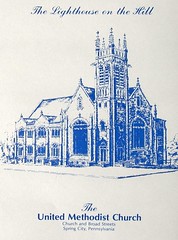Ask A Pastor: Where Was God When...?
July 22, 2007
from Psalm 42
"Hope in God; for I shall again praise him, my help and my God." – Psalm 42:5
My sermon outline:
• To Catch a Predator, Dateline NBC Chris Hansen, identify and detain child sexual abusers. Suicide. Nearly 300 arrests in 3 years (11 stings). Where is God, that children are sexually abused? Scout leaders and even priests break their trust and engage in sexual abuse. Where is God?
One race enslaves or seeks to destroy another. Apartheid. 9/11. Holocaust. Where was God?
Tens of thousands starve daily. God?
Businesses and governments abuse power and breed corruption. God?
Surely there have been thousands and millions of Godloving Godfearing faithful innocents who have suffered untold injustices at the hands of evil people. Where is God?
• Even if you remove the “hands of evil people” element, human suffering abounds through natural disasters.
Hurricane Katrina. 2,000 lives lost, plus millions, (poor, disabled, oppressed) displaced, homeless.
Back up a few months to the day after Christmas, 2004, Indian Ocean Earthquake and tsunami, claiming 230,000 lives. God?
Spanish flu pandemic of 1918, counts from 25 to 100 million dead. God?
Black Death / Plague, wipes out 1 to 2 thirds of Europe in the mid 1300’s. Not only was the Church hit hard, but it lost credibility as it failed to heal, prevent death. God?
Where Was God When? Why do these terrible things happen?
• Psalm 42 David the psalmist entertains this question with something like a split-personality. Devil on one shoulder Angel on the other. Psalm 42 simultaneously reveals both despair and hope, both proclaims downcast and praise. You’ll want your Bible in hand for this.
• Verses 1-3. Starts with image of water, which sets the stage. Longs for life giving water, communion with God. But soul is cut off from God. Instead of receiving, he’s losing lifewater, tears days on end, pouring out soul as people mock. (verse 4: it wasn’t always this way. It used to be real good. I used to be able to see God)
• The angel kicks in in verse 5. Remember the good times! You know God has been with you! God will never leave you nor forsake you! (verse 5) Why are you so sad? You’ll praise God again.
• David answers in verse 6: I’m grieving here, I can’t see God in this world anymore, but I remember. I remember. It’s etched in my memory like the outline of Mount Hermon, the greatest mountain in the land, is etched in the skyline. I remember. (angel grins)
• little interlude: remember mountaintop experiences. Two things: sustain when life’s griefs take over, also refocus on God, repent if needed. 2 times to praise: when you feel like it, and when you don’t.
• Who doesn’t want to see you happy? The devil pops in, verse 7. Took me a while to get this one: “Deep calls to deep at the thunder of your cataracts, all your waves and your billows have gone over me.” Deep to deep? Cataracts? Thundering waterfall of whatever to separate from God. Not a gentle rain but a tornado of disaster. Onslaught of events. Pounded, beat, drowned. Like the Allied forces storming the beaches of Normandy. Trouble upon trouble, and (says the devil) God is wiping you out.
• Angel counters, verse 8: What is the definition of God? God is love. How are you defined? You are defined by God… God defines your life. God showers you with love.
• Verse 9-10: devil tries a new tack: says “man, you fully rely on God, and this happens? God’s forgotten you. Go ahead, ask him.” nurtures seed of doubt of God’s goodness.
• Psalm 42 ends with verse 11, a repeat of what the angel said before. Angel doesn’t need to change what it says, just repeat. Why are you downcast? Why no hope? Didn’t you hear me? Hope is stronger than any of the forces you face; God is not a forsaker but the giver of life. God is your help. Trust me, says the angel. Trust God. Remember.
• City of Angels, 1998, Nic Cage plays Seth, an angel who falls in love with a doctor Meg Ryan.
Seth: You're a good doctor.
Maggie: How do you know?
Seth: I have a feeling.
Maggie: Yeah, well that's pretty flimsy evidence.
Seth: Close your eyes. Just for a second... what am I doing?
Maggie: You're... touching me.
Seth: How do you know?
Maggie: Because, I feel it.
Seth: You should trust that. You don't trust it enough.
• Ps 42 gives us this little dialogue between doubt and faith, in this attempt to answer Where was God, Why does such happen. Reminds us that God is, that God is love, that God is rock, that God is life, that God is worthy of praise.
• People will always ask why. We’re designed to. If disaster didn’t happen, we’d ask why.
• The existence of darkness does not negate the presence and the power of light; indeed the light shines in the darkness and the darkness cannot overcome it.
Be still and know that God is.
Close your eyes and listen to your own breath, your heartbeat, and know that God gives it.
Feel the pulse, the warmth in your skin, remember the mountain top, remember the Shepherd.
• 137 Psalm 23
• 534 Be Still My Soul
- Pastor Kerry
This Sunday: 48 in worship. Warm and humid.

